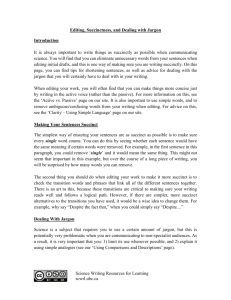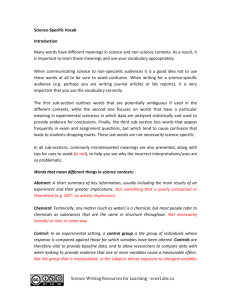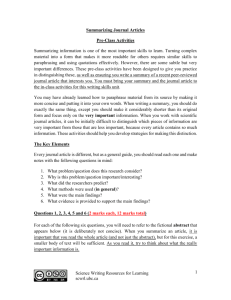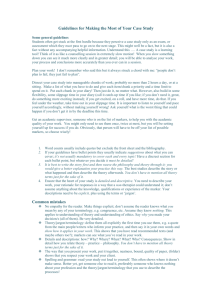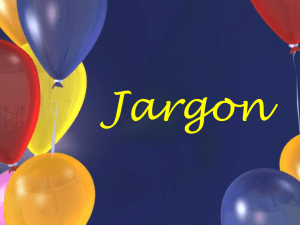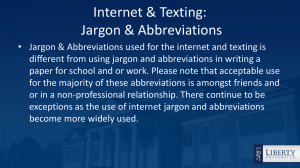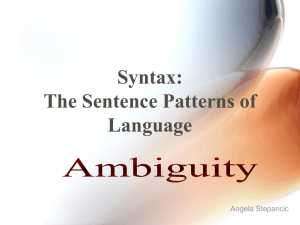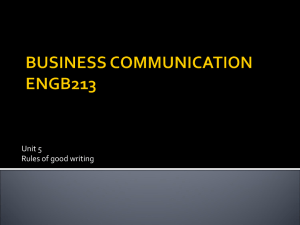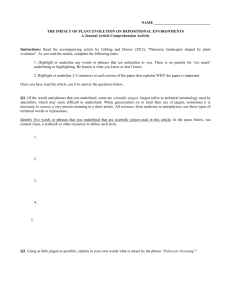Unit 4: In-class activities (peer review)
advertisement
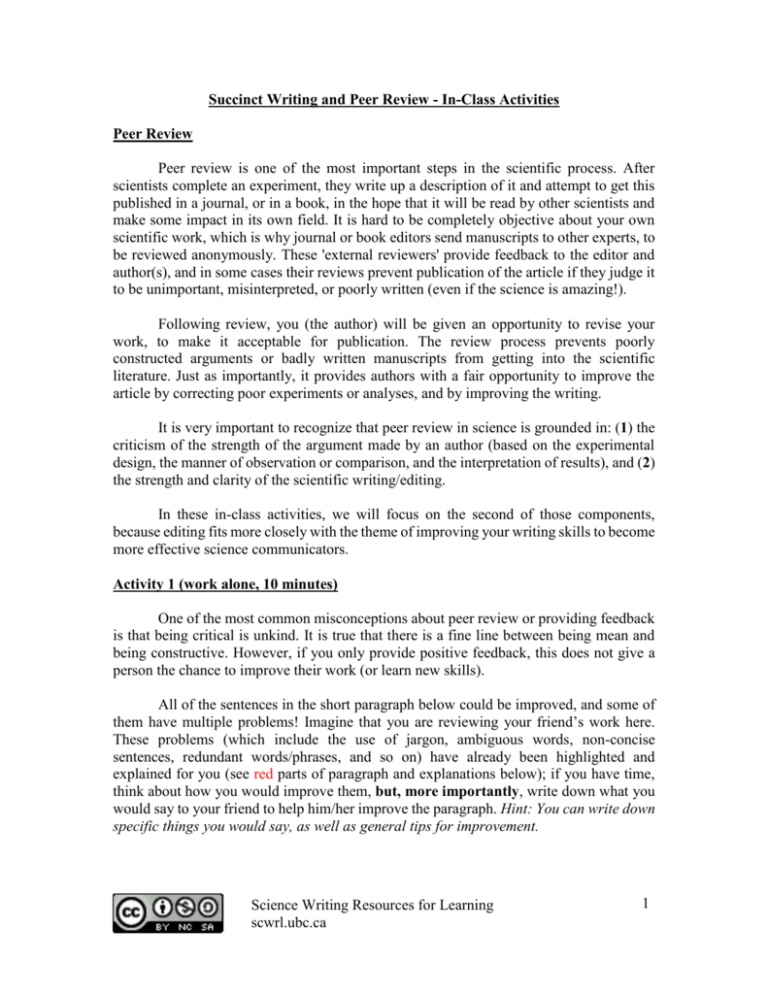
Succinct Writing and Peer Review - In-Class Activities Peer Review Peer review is one of the most important steps in the scientific process. After scientists complete an experiment, they write up a description of it and attempt to get this published in a journal, or in a book, in the hope that it will be read by other scientists and make some impact in its own field. It is hard to be completely objective about your own scientific work, which is why journal or book editors send manuscripts to other experts, to be reviewed anonymously. These 'external reviewers' provide feedback to the editor and author(s), and in some cases their reviews prevent publication of the article if they judge it to be unimportant, misinterpreted, or poorly written (even if the science is amazing!). Following review, you (the author) will be given an opportunity to revise your work, to make it acceptable for publication. The review process prevents poorly constructed arguments or badly written manuscripts from getting into the scientific literature. Just as importantly, it provides authors with a fair opportunity to improve the article by correcting poor experiments or analyses, and by improving the writing. It is very important to recognize that peer review in science is grounded in: (1) the criticism of the strength of the argument made by an author (based on the experimental design, the manner of observation or comparison, and the interpretation of results), and (2) the strength and clarity of the scientific writing/editing. In these in-class activities, we will focus on the second of those components, because editing fits more closely with the theme of improving your writing skills to become more effective science communicators. Activity 1 (work alone, 10 minutes) One of the most common misconceptions about peer review or providing feedback is that being critical is unkind. It is true that there is a fine line between being mean and being constructive. However, if you only provide positive feedback, this does not give a person the chance to improve their work (or learn new skills). All of the sentences in the short paragraph below could be improved, and some of them have multiple problems! Imagine that you are reviewing your friend’s work here. These problems (which include the use of jargon, ambiguous words, non-concise sentences, redundant words/phrases, and so on) have already been highlighted and explained for you (see red parts of paragraph and explanations below); if you have time, think about how you would improve them, but, more importantly, write down what you would say to your friend to help him/her improve the paragraph. Hint: You can write down specific things you would say, as well as general tips for improvement. Science Writing Resources for Learning scwrl.ubc.ca 1 Competition for food resources that are completely1 imperative for the survival of any individual of a species ensures that there are powerful selective forces2 exerted3 on these individuals. Because competition should typically (in more cases than not4) be significantly5 higher between conspecifics6 than between members of different species, those that are impressive7 foragers8 typically pass their genes on to future generations in time to come9. That individuals develop multi-faceted predator-induced contextdependent behavioural strategies10 in the short-term is also interesting. It shows that the burning11 desire to survive can cause individuals to develop completely12 unique strategies based on the environments in which they find themselves to be living in13. Specific problems: 1: Redundant word. 2: Jargon (should be explained in lay language). 3: Unnecessarily complex word (‘put’ is better than ‘exerted’). 4: Redundant phrase. 5: Jargon. 6: Jargon. 7: Ambiguous meaning (‘successful’ is better than ‘impressive’). 8: Jargon. 9: Redundant phrase. 10: Hard to read, non-concise sentence with lots of adjectives, redundancy and jargon (‘complex strategies due to the presence of predators’ is better than ‘multi-faceted predator-induced context dependent behavioural strategies’). 11: Ambiguous meaning (‘strong’ is better than ‘burning’). 12: Redundant word. 13: Nonconcise phrase (‘live’ would be better than ‘find themselves to be living in’). * Please note there will be a brief class discussion about Activity 1; you can talk about the kind of feedback you provided (and what you should have said). * Activity 2 (work together, 10 minutes) Take out the abstract that you re-wrote for one of the two journal articles posted on Connect (Question 10 of the pre-class assignment). Pass it to a partner, and have him/her provide some general feedback while you do the same for his/her abstract. When reading your partner’s work before giving feedback, focus on the following three things: 1: Are there any sentences that could be more concise? 2: Are there any unnecessarily complicated words or redundant qualifiers? 3: Are there any ambiguous words in the sentences? 4: Is there any jargon that should be dealt with? Activity 3 (work alone, and then together, 15 minutes) Now, spend a few minutes to re-write your version of the abstract to improve it based on the feedback provided by your partner. Once you have completed your re-write, pass it to the partner you worked with before, and (1) have him/her assess whether it has been improved, and (2) tell him/her whether you found his/her feedback useful. The purpose of this exercise is two-fold. Firstly, it should show you the importance of editing your work to improve it based on what your peers advise you, and secondly, it Science Writing Resources for Learning scwrl.ubc.ca 2 should indicate how useful your feedback is; if someone has edited their work based on what you suggested they should do, and it still doesn’t read smoothly, then perhaps you were not constructive enough in what you said. Activity 4 (as a class, 5 minutes) Spend some time looking at the sample versions of the re-written abstracts to make sure you were on the right track in terms of highlighting issues with the writing, and phrasing your review in a constructive way. Science Writing Resources for Learning scwrl.ubc.ca 3 Science Writing Resources for Learning scwrl.ubc.ca 4
